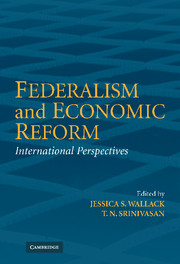Book contents
- Frontmatter
- Contents
- List of Contributors
- Acknowledgments
- 1 Analyzing Federalism: Stylized Models and the Political Economy Reality
- 2 Federalism in Argentina and the Reforms of the 1990s
- 3 Australia: Central Fiscal Dominance, Collaborative Federalism, and Economic Reform
- 4 The Brazilian Federation: Facts, Challenges, and Perspectives
- 5 Changing with the Times: Success, Failure, and Inertia in Canadian Federal Arrangements, 1945–2002
- 6 Fiscal Federalism and Economic Reform in China
- 7 Indian Federalism, Economic Reform, and Globalization
- 8 Mexico's Decentralization at a Crossroads
- 9 Transfer Dependence and Regional Disparities in Nigerian Federalism
- 10 Conclusions and Lessons for Further Study
- Index
- References
2 - Federalism in Argentina and the Reforms of the 1990s
Published online by Cambridge University Press: 25 July 2009
- Frontmatter
- Contents
- List of Contributors
- Acknowledgments
- 1 Analyzing Federalism: Stylized Models and the Political Economy Reality
- 2 Federalism in Argentina and the Reforms of the 1990s
- 3 Australia: Central Fiscal Dominance, Collaborative Federalism, and Economic Reform
- 4 The Brazilian Federation: Facts, Challenges, and Perspectives
- 5 Changing with the Times: Success, Failure, and Inertia in Canadian Federal Arrangements, 1945–2002
- 6 Fiscal Federalism and Economic Reform in China
- 7 Indian Federalism, Economic Reform, and Globalization
- 8 Mexico's Decentralization at a Crossroads
- 9 Transfer Dependence and Regional Disparities in Nigerian Federalism
- 10 Conclusions and Lessons for Further Study
- Index
- References
Summary
Federalism in general, and fiscal federalism in particular, are crucial axes of Argentina's history, of Argentina's current situation, and of Argentina's possible futures. This paper provides a tour of the recent history of fiscal federalism in Argentina and an overview of its current configuration and main problems.
Federalism is ingrained in the Argentine political system in several ways that are crucial for national policy. Provincial governors are important players in the national game, as they are often party bosses wielding substantial leverage over national politicians via electoral mechanisms and party practices. Provinces are also heavily dependent on central monies for their finances, leading to a particular intertwining of national and subnational politics and policies. This federal connection is, in turn, intertwined with some more general characteristics of the workings of the Argentine policymaking process, which is characterized by the inability to establish and enforce efficient intertemporal agreements. This inability maps into policies that are either too volatile (responding to political opportunism) or too rigid, as a protection against that opportunism. These policy characteristics are particularly salient in the federal fiscal domain.
After a brief description of some general characteristics of Argentina and of its fiscal federalism in Section I, Section II focuses on the relationship between federalism and the market-oriented reform process of the 1990s. The 1989 economic crisis provided the incentives that led to the initiation of the reforms, triggering a series of delegation patterns conducive to the adoption of the reform agenda.
- Type
- Chapter
- Information
- Federalism and Economic ReformInternational Perspectives, pp. 25 - 84Publisher: Cambridge University PressPrint publication year: 2006
References
- 9
- Cited by

